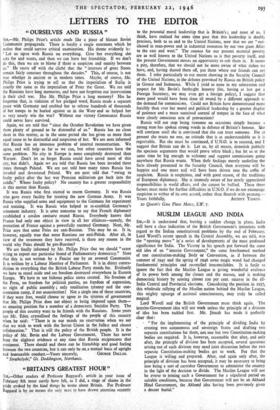" BRITAIN'S GREATEST HOUR "
Sts,—Other readers of Professor Rappard's article in your issue of February 8th must surely have felt, as I did, a tinge of shame in the pride evoked by the kind things he wrote about Britain. For Professor Rappard is by no means the only man to have drawn attention recently
to the potential moral leadership that is Britain's ; and most of us, I think, have realised for some time past that this leadership is doubly precious, both to us and to the United Nations, now that we are " out- classed in man-power and in industrial resources by our two giant Allies to the east and west"- The reasons for our present material poverty are as well known to the United Nations as is that poverty itself, and the present Government misses no opportunity to rub them in. It seems a pity, therefore, that we should not be more aware of what riches we have, and, having dusted them off, put them where our friends can see them. I refer particularly to our recent showing in the Security Council of the United Nations, in the debates provoked by Russia on British policy in Greece and Indonesia. While I yield to none in my admiration and respect for Mr. Bevin's forthright honesty (for, having at last got a Foreign Secretary, we may even get a foreign policy), I suggest that more good would have been done all round. by a different approach tc the demand for commissions. Could not Britain have demonstrated more forcibly than ever her moral and political leadership by a greater display of patience and a more sustained control of temper in the face of what were clearly conscious acts of provocation?
Russia will not stop being tiresome on occasions simply because a strong man has spoken strong words in defence of Britain's honour. She will continue until she is convinced that she can trust someone. For at present she trusts no one, an attitude that is as understandable as it is regrettable. But she must be convinced, if U.N.O. is to succeed, and I suggest that Britain can do it. Let us, by all means, demolish publicly the specious arguments that would prove white black ; but let us at the same time be big enough to welcome and support commissions going anywhere that Russia wants. When their findings merely underline the facts already presented to the Security Council, then everyone will he happier and one more nail will have been driven into the coffin of suspicion. Russia is suspicious, and with good reason, of the traditions of European diplomacy. She is intensely aware of her newly appreciated responsibilities in world affairs, and she cannot be bullied. These three factors must make for further difficulties in U.N.O. if we do not encourage suspicion to wither of its uwn accord, rather than flourish with pruning.—






























 Previous page
Previous page